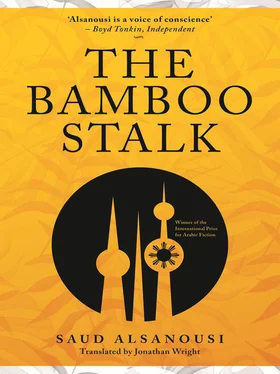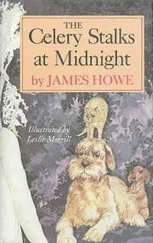He went back to the sitting room, saying that the man was a drunk. ‘Why were you laughing?’ I asked.
He shook his head and said, ‘The man was saying I had good taste.’ I followed him into the room. He sat behind his desk and I sat on the sofa opposite.
‘What did you say to him before you pushed him?’ I asked. Ghassan looked right into my eyes. ‘I said. .’ He paused a moment and looked away. ‘I said “You’ve been following my son, you. . ”’ He used a word that was apparently a Kuwaiti insult that I didn’t understand. He then pretended to be busy with the papers on his desk.
What about me? I too needed something I could pretend to be doing, to distract me from what he had said. As he tidied up his papers, he asked me what I’d like to drink. I ignored his question, although I was thirsty and my throat was dry.
‘Ghassan?’ I said, to call his attention. He looked up at me. I hesitated before continuing. ‘Did you bring me to Kuwait to get revenge on my family?’
He smiled. ‘I see you’ve become Kuwaiti sooner than I expected,’ he said. I knitted my eyebrows in puzzlement. Ghassan continued: ‘Suspicion, mistrusting others. In Kuwait the trust that used to exist is no longer there.’ He didn’t elaborate. He said no more.
‘I misjudged you,’ I said. He still said nothing. ‘Why didn’t you explain, defend yourself, complain?’
He pulled another cigarette from the packet on his desk. When Ghassan lit the cigarette I prepared to hear something interesting. He took a long drag. Then the words came out from deep inside him, along with the smoke. ‘Over many years I’ve suffered various injustices and I haven’t complained.’ My eyes filled with tears. ‘So why should I hold it against you when you misjudge me in this way?’ I didn’t say a word. ‘I don’t have time for that, my friend,’ he said with a smile.
‘Your friend?’ I said, irritated by the word. He was puzzled by my question. ‘I was your son just now, at the door,’ I explained.
How could a smile and tears appear on one face at the same time in this way? He was smiling broadly and his eyes were red and glistening with tears. He had to struggle to get the words out. ‘OK, my son,’ he said.
I was happy, and deeply moved. Now that I had gained Ghassan as a father, after missing him all those months in his role as my father’s friend, I prepared to leave.
‘Where are you going?’ he asked.
‘To my flat,’ I said.
He picked up his car keys and said, ‘I’ll give you a lift.’
9
In April 2009 Kuwait was transformed into a vast advertising display. There were thousands of posters of various sizes in all the streets. The numbers grew day by day and in the end there was a poster wherever you turned your head — along the sides of the streets, on the roundabouts, on the back windows of cars and on the roofs of buildings.
As I was riding my bike to Ibrahim’s place one day, I suddenly had a feeling I was being watched by all the faces looking out from the posters. Some of the faces were smiling, others were grim. There were sharp, intelligent faces, expressionless faces and stupid faces. Most of the men on the posters were wearing traditional Kuwaiti dress, but some appeared in suits and ties. Very few of the advertisements had pictures of women. I later found out that this bonanza of posters in the streets was part of the preparations for their parliamentary elections.
Their? Why their and nor our ? I was about to delete the word or change it, but it would jar if I changed it to our . I’ll leave it as it is. Their .
I got to Ibrahim’s place and found him in a bad mood, despite the welcome he gave me. I wasn’t used to seeing his face without his calm smile that made it distinctive, or that he made distinctive. He brought me a cup of tea. He asked me how I was and how work was going. I ignored his questions and said, ‘You don’t seem your normal self.’
He apologised and said, ‘You’re right.’ He handed me two newspapers and pointed to stories he had circled in pen. He had underlined some of the words and drawn arrows pointing to comments he had written in the small blank spaces on the page. I looked from one report to the other. One of them had a picture of a young woman hanging from a ceiling fan by a rope.
I handed them back to him. ‘They’re in Arabic,’ I said, puzzled.
Ibrahim tapped his forehead and said, ‘How stupid of me! I’m sorry.’ He went to the corner of the room, where there was a computer. He tapped on the keyboard until the printer churned out two pages. He handed them to me and said, ‘That’s my translation of what was in the Kuwaiti papers this week. I’m going to send it by email to the newspapers in the Philippines. I’ve started to hate this work,’ he mumbled.
I picked up the pieces of paper to read. Filipina Maid Slits Baby’s Throat in Revenge on Employer , said the first headline. I didn’t read any further. Filipina Maid Hangs Herself, read the second. The report sent a shiver down my spine. I read it carefully. In her late teens, in her room in her employer’s house, suicide by hanging, a rope, the ceiling fan.
I read the report word by word and I could hear my heartbeat in my ears. In my repeated readings of the report all I was doing was looking for the name of the woman. Any young woman who committed suicide, anywhere in the world, might as well have been Merla.
I felt depressed and I was about to leave. ‘Where are you going?’ Ibrahim asked me.
‘I just remembered something important,’ I said, heading for the door.
* * *
I rested the laptop on my legs. The email sign-in page was on the screen waiting for me to put in the password that would take me to my inbox. I wrote the first numbers, then waited a little. I looked at them, then deleted them. I started again but I didn’t complete the number. The idea that there might be a message from Merla drove me to put in the rest of the number and press ‘enter’. But I was so frightened that the message I expected might not be there that I folded down the screen, cursing my weakness and helplessness and Merla’s strength and craziness. Why was all this happening to me?
I picked up the phone, my hand shaking. I scrolled through the numbers. I called the number and waited for the other side to answer. There was no reply. It was 9.30 p.m. where I was, 2.30 a.m. in the Philippines.
I called again, and again, many times.
I got angrier and angrier. I swore I wouldn’t stop trying until I received an answer or my phone battery went flat.
At last! ‘Hello,’ I said.
‘Yes, who’s calling?’
Apparently I had woken her up, but her voice still sounded sleepy.
‘It’s Isa.’
‘Who?’
‘It’s José,’ I said, correcting myself.
She didn’t say anything.
‘Maria!’ I said. ‘Tell me, where’s Merla?’
As soon as I uttered my cousin’s name, her sleepy voice woke up and she started to cry. I repeated my question, terrified. She fought back her tears and said, ‘She doesn’t want to talk to anyone.’
I lost my nerve and shouted at her. ‘Enough!’ I said. ‘You can save lies like that for Mama Aida.’
Her voice suddenly disappeared. ‘Hello, hello?’ I said.
I could still hear rapid breathing, so she was still on the line. I didn’t say anything more, in case I heard bad news. When the other person is silent, it can sometimes be more frightening than when they tell us a truth we’d rather not hear. That kind of silence opens the door to terrifying possibilities that may be worse than what we are frightened of. What might she be hiding? Why is the world spinning around me? I hoped she would keep crying so that she wouldn’t say what I didn’t want to hear. Go on, go on, cry, Maria. Mind you don’t say anything. It’s better that you cry at my question than that I cry at your answer . She was still breathing fast. Words and phrases from the story that Ibrahim had translated floated in my head. ‘In her late teens’, ‘hanging’, ‘rope’, ‘ceiling fan’. Terrifying images flashed before my eyes. The story in the newspaper. The picture. The lines that Ibrahim had drawn under the words swirled around me, surrounded me, pulled at me. The circle he had drawn around the story was wrapped around my neck like a noose, getting tighter, strangling me.
Читать дальше












